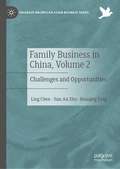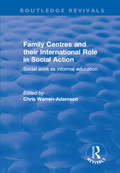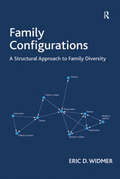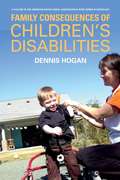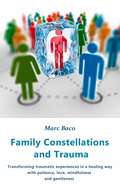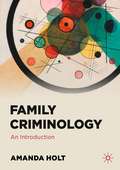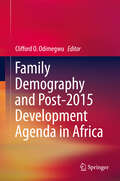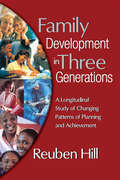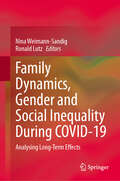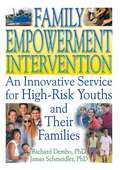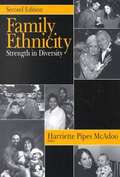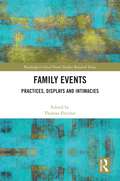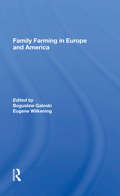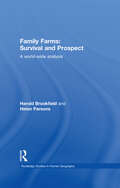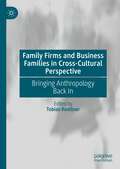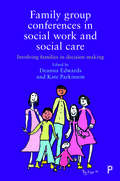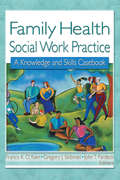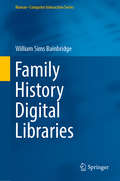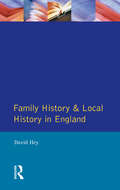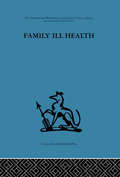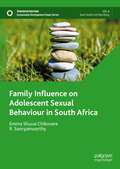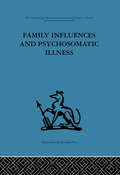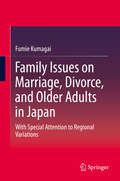- Table View
- List View
Family Bonds
by Ted Maris-WolfBetween 1854 and 1864, more than a hundred free African Americans in Virginia proposed to enslave themselves and, in some cases, their children. Ted Maris-Wolf explains this phenomenon as a response to state legislation that forced free African Americans to make a terrible choice: leave enslaved loved ones behind for freedom elsewhere or seek a way to remain in their communities, even by renouncing legal freedom. Maris-Wolf paints an intimate portrait of these people whose lives, liberty, and use of Virginia law offer new understandings of race and place in the upper South. Maris-Wolf shows how free African Americans quietly challenged prevailing notions of racial restriction and exclusion, weaving themselves into the social and economic fabric of their neighborhoods and claiming, through unconventional or counterintuitive means, certain basic rights of residency and family. Employing records from nearly every Virginia county, he pieces together the remarkable lives of Watkins Love, Jane Payne, and other African Americans who made themselves essential parts of their communities and, in some cases, gave up their legal freedom in order to maintain family and community ties.
Family Business in China, Volume 2: Challenges and Opportunities (Palgrave Macmillan Asian Business Series)
by Ling Chen Jian An Zhu Hanqing FangUnlike other economies, family businesses in China are greatly affected by the derived Confucian culture, excessive marketization, as well as the seemingly endless institutional supervision by a transitional Chinese government. China has a strong historical legacy, devoted to patriarchal values and strong family-centered traditions.This volume discusses the current status, upcoming challenges, and future prospects for family businesses in China. It explores unique organizational characteristics that are associated with Chinese family firms, such as being entrepreneurial, having concentrated power in the hands of the family business owners, and extensive family and semi-family involvement in the business. It also discusses shared features of strategic actions among Chinese family firms that include technology innovations, diversification, and internationalization, as well as the political connections that Chinese family firms often have. This book offers researchers a comprehensive overview of small family firms that are likely to be home-based microenterprises as well as large publicly traded business groups that are frequently owned by business families.
Family Centres and their International Role in Social Action: Social Work as Informal Education (Routledge Revivals Ser.)
by Chris Warren-AdamsonThis title was first published in 2001: Family centre practice is one of the success stories of the past twenty years. As well as contributing creative ideas to centre practice this important edited collection highlights the role of practitioners as developmental or informal educationalists. International contributors challenge care management in child protection as the dominant discourse in child care social work and instead advance integrated practice in the internationally developing role of family centres as a more authentic and hopeful practice for children and families. The contributors outline ways of avoiding reductionism - social work reduced to a protective and assessment role - and show how socially inclusive practice can be sustained with very marginalized families. The book argues that there is a need for the social work training curriculum to emphasize social work's debt to social and informal education, and concludes with a call for an international forum of family centre practice.
Family Configurations: A Structural Approach to Family Diversity
by Eric D. WidmerFamily Configurations develops current scholarship on families and intimate lives by demonstrating that family relationships, far from being fluid and inconsequential, are more structured and committed than ever. Based on a series of empirical studies carried out in the US and Europe, this volume reveals the diversity of family relationships that emerge as a result of various key family issues, emphasizing the supportive and disruptive interdependencies existing among large sets of family members beyond the nuclear family. By applying social network methods to uncover the relational patterns of contemporary families, and making use of rich empirical data, this book draws on recent developments in family sociology, social network analysis and kinship studies to present a fascinating interdisciplinary approach to the family.
Family Consequences of Children’s Disabilities
by Denis P. HoganThe Americans with Disabilities Act (ADA) and other national policies are designed to ensure the greatest possible inclusion of people with disabilities in all aspects of American life. But as a matter of national policy we still place the lion's share of responsibility for raising children with disabilities on their families. While this strategy largely works, sociologist Dennis Hogan maintains, the reality is that family financial security, the parents' relationship, and the needs of other children in the home all can be stretched to the limit. In Family Consequences of Children's Disabilities Hogan delves inside the experiences of these families and examines the financial and emotional costs of raising a child with a disability. The book examines the challenges families of children with disabilities encounter and how these challenges impact family life. The first comprehensive account of the families of children with disabilities, Family Consequences of Children's Disabilities employs data culled from seven national surveys and interviews with twenty-four mothers of children with disabilities, asking them questions about their family life, social supports, and how other children in the home were faring. Not surprisingly, Hogan finds that couples who are together when their child is born have a higher likelihood of divorcing than other parents do. The potential for financial insecurity contributes to this anxiety, especially as many parents must strike a careful balance between employment and caregiving. Mothers are less likely to have paid employment, and the financial burden on single parents can be devastating. One-third of children with disabilities live in single-parent households, and nearly 30 percent of families raising a child with a disability live in poverty. Because of the high levels of stress these families incur, support networks are crucial. Grandparents are often a source of support. Siblings can also assist with personal care and, consequently, tend to develop more helpful attitudes, be more inclusive of others, and be more tolerant. But these siblings are at risk for their own health problems: they are three times more likely to experience poor health than children in homes where there is no child with a disability. Yet this book also shows that raising a child with a disability includes unexpected rewards—the families tend to be closer, and they engage in more shared activities such as games, television, and meals. Family Consequences of Children's Disabilities offers access to a world many never see or prefer to ignore. The book provides vital information on effective treatment, rehabilitation, and enablement to medical professionals, educators, social workers, and lawmakers. This compelling book demonstrates that every mirror has two faces: raising a child with a disability can be difficult, but it can also offer expanded understanding. A Volume in the American Sociological Association's Rose Series in Sociology
Family Constellations and Trauma: With patience, love, mindfulness and gentleness Transforming traumatic experiences in a healing way
by Marc BacoA supportive book for those who want to know: How you can work cautiously and with patience on your traumatic experiences. How to find and activate resources. How you can quickly bring feelings and behavior triggered by trauma into balance. How you can overwrite your traumatic experiences step by step with the help of family constellations. How you can transform trauma in the long term with family constellations.
Family Criminology: An Introduction
by Amanda HoltThis full-colour textbook offers a fresh conceptual approach to understanding the intersections of crime, criminal justice and family life. In doing so, it proposes a brand new sub-discipline of Criminology that places the family at the heart of its analysis, offering a groundbreaking approach to the study of crime and deviance. Adopting an interdisciplinary perspective, this introductory text explores topics from across the spectrum of criminological scholarship, including youth justice, prisons, organized crime, family violence and homicide, and victimology. By drawing together these distinct topics and identifying and discussing their familial connections, this book argues for the importance of family life in the theory and practice of crime and justice. Key questions discussed throughout the text include: How does the criminal justice system engage with families across different contexts? In what ways do crime and criminal justice processes impact on family life? In what ways can families transform the criminal justice system for the betterment of all? This book challenges commonly-held and simplistic assumptions about what the family is in relation to crime and justice and, by doing so, engages in deeper debates about human rights, social justice and the role of the state in relation to families and crime. It includes pedagogic features including conceptual toolboxes, questions for reflection, textboxes, a glossary and interviews with practitioners.
Family Demography and Post-2015 Development Agenda in Africa
by Clifford O. OdimegwuThis book is a comprehensive analysis of the structure, determinants and consequences of changes in sub-Saharan African families, thereby representing an Afrocentric description of the emerging trends. It documents various themes in the sub-disciplines of family demography. The first section of the book focuses on philosophical understanding of African family, its theoretical perspectives, and comparative analysis of family in the 20th and 21st centuries. The second section covers family formation, union dissolution, emerging trend in single parenthood, and adolescents in the family. The following section describes types, determinants and consequences of African family changes: health, childbearing, youth development, teen pregnancy and family violence and the last chapter provides systematic evidence on existing laws and policies governing African family structure and dynamics. As such it illustrates the importance of family demography in African demographic discourse and will be an interesting read to scholars and students in the field of demography, social workers, policy makers, departments of Social Development in countries in Africa and relevant international agencies and all those interested in understanding the African family trajectory.
Family Development in Three Generations: A Longitudinal Study Of Changing Patterns Of Planning And Achievement
by Reuben HillFamily Development in Three Generations is an unusual kind of multi-generational gathering--the result of a massive, in-depth research effort. It is based upon Hill's personal interviews conducted with over 300 families during the course of a year. The discussion results from these interviews, from the statistical information that they produced, and from Hill's consultation with five other fellow researchers. This scholarly contribution to the family field thoroughly analyzes the complexities of the modified generational network. As a multi-generational study, it is pervaded by the vigorous spirit that usually characterizes such research.In his preface to Family Development in Three Generations Reuben Hill invites the reader "to drop in on any generational gathering" where "you will hear how much better or worse life was in grandfather's day than today." Such discussions are usually controversial and center upon shared experiences. Such rhetoric, polemic, and energy sustain conversations among generations.Family Development in Three Generations penetrates to the life center of intimate change in American society. It is a wide-ranging volume that presents varied and highly significant insights into many fields. Scholars will find it a vital contribution to their knowledge of the subject and laymen will find it full of valuable information that they can profitably apply to their own families. The work is widely recognized as a classic in longitudinal analysis of family life.
Family Dynamics, Gender and Social Inequality During COVID-19: Analysing Long-Term Effects
by Ronald Lutz Nina Weimann-SandigThis book critically analyzes both the negative and positive impacts of the Coronavirus pandemic, focusing on changes in families, gender developments, and the evolution of social inequality structures. The Corona pandemic, with its unprecedented restrictions on contact, has meant that families have been challenged in their functioning in a very special way. International studies show that socioeconomic factors such as education, income, but also the geographic center of life of families and women in particular, had an important influence on the management of the pandemic. Despite all negative side effects of the Corona pandemic, there were nevertheless also innovative impulses, especially in the field of social work, particularly work with families. The book's 18 chapters, organized in six sections, highlight not only short-term changes but also longer-term developments that either require a corresponding concept of measures or action or can be evaluated as drivers of innovation in the pandemic. Part I: IntroductionPart II: Family DynamicsPart III: Child Well-being Part IV: Social Work with Children and FamiliesPart V: Gender and COVID-19Part VI: Conclusion The special feature of the volume is its global perspective. Authors from different countries describe changes and developments on these topics and make clear what profound effects the pandemic had on families, social inequality structures, and gender-specific situations. The anthology does not comprehensively reflect international perspectives. Rather, it leaves it up to readers to compare the developments in the respective countries with their own country of origin from a comparative cultural perspective. In this way, ideas for future, overarching research projects may be stimulated.Family Dynamics, Gender and Social Inequality During COVID-19 is timely and relevant reading for scientists, students, and practitioners in sociology, social work, and political science.
Family Empowerment Intervention: An Innovative Service for High-Risk Youths and Their Families
by Letitia C Pallone Richard Dembo Robert James SchmeidlerUse this important intervention to improve your practice with substance-using youths and their families!This vital book gives you a detailed review of a National Institute on Drug Abuse-funded, long-term clinical trial of the Family Empowerment Intervention (FEI). The subjects are youths who have been arrested and processed at the Hillsborough County Juvenile Assessment Center and their families. With information on the conceptual foundations and clinical practices of the intervention and an examination of its one-year and longer-term impact on these youths&’ recidivism and psychosocial functioning, Family Empowerment Intervention: An Innovative Service for High-Risk Youth and Their Families will help you provide better services to these difficult-to-serve clients.Bringing you up-to-date on all aspects of this unique intervention, this book: examines the pressing need for this kind of intervention gives you an essential overview of the FEI describes the selection process for subject involvement in the project and the methods of data collection used examines the FEI&’s impact on crime as well as its short- and long-term impact on and drug and alcohol use suggests ways to improve the FEIComplete with dozens of easy-to-understand tables and figures as well as five helpful appendixes, this well-referenced volume is essential reading for anyone working with this highly volatile population. Make it a part of your collection today!
Family Estrangement: A matter of perspective
by Kylie AglliasFamily estrangement is larger than conflict and more complicated than betrayal. It is entwined in contradictory beliefs, values, behaviours and goals and is the result of at least one member of the family considering reconciliation impossible and/or undesirable. The cessation of familial relations, whether that involves rejection or deciding to leave, can be an inordinately traumatising experience. Whilst data suggests that around 1 in 12 people are estranged from at least one family member this topic is rarely discussed or researched. Based on the author’s in-depth research and exploration of the topic of estrangement, Family Estrangement: A Matter of Perspective captures the unique lived experiences of both estrangee and estranger. Offering multiple perspectives drawn from academic and popular literature as well as case studies, the book contextualises its chapters within current theoretical understandings of family relationships and estrangement, including Loss and Grief theories, Attachment Theory and Bowen Family Systems Theory. Practice sections provide estranged readers and professionals with a structured approach to exploring the various aspects of estrangement within a family and to help them identify resilience, strengths and strategies which individuals may harness as they attempt to live with estrangement. Written with the aim to provide guidance in understanding estrangement in context, this book is suitable for estranged family members and all professionals who encounter and work with people affected by estrangement, including social workers, counsellors, psychologists, allied health professionals, doctors, nurses and legal professions.
Family Ethnicity: Strength in Diversity
by Harriette Pipes McadooFamily ethnicity involves the unique family customs, proverbs, and stories that are passed on for generations. It covers Native American Indians, Native Hawaiians, Mexican American and Spanish, African American, Muslim and Asian American families.
Family Events: Practices, Displays and Intimacies (Routledge Critical Event Studies Research Series.)
by Thomas FletcherAn unprecedented exploration of the intersection of events and family studies, Family Events uses events as a lens through which to explore the concepts of families, family practices, family displays and family intimacies. Family Events explores the idea that how families come to be and moreover, come to be defined as ‘families’ relies on events; whether that be via ‘family events’ – those which serve to celebrate being part of ‘my’ family – (e.g., birthdays, weddings, funerals), ‘events experienced as a family’ (e.g., a holiday or day trip), or ‘events which impact families’ (e.g., recession, war, global health emergency). Family Events brings together contributions from the social sciences, leisure and event studies which focus on a variety of different event contexts, including the life cycle, death and illness, sport, holidays and community and religious festivals. Family Events offers a multitude of insightful perspectives on the intersection of events and family studies and is a valuable resource for academics and students with a research interest in events, leisure and the family.
Family Farming In Europe And America
by Boguslaw GaleskiMuch has happened since agricultural economists and rural sociologists met at the University of Chicago in 1946 to discuss family farming. The problems and issues related to the structure of agriculture have been intensified by current economic considerations, which promote the growth of larger-scale commercial farming operations and edge out many smaller farms owned, operated, and worked by families. In this book, contributors from eleven nations in Europe and North America provide a comparison of farm structure under different economic and political systems, including Poland as an example of a non-market economy. In addition to providing information on how local, state, and international policies have affected the agricultural enterprise, they look at the role of farmers' organizations in policy formulation and take note of changes in farm patterns and policies that have had an impact on farm production, off-farm work, and the welfare of farm families and rural communities.
Family Farms: A World-Wide Analysis (Routledge Studies in Human Geography #Vol. 20)
by Harold Brookfield Helen ParsonsMarx, Lenin and Kautsky all regarded family farming as doomed to be split into capitalist farms and proletarian labour. Most modern economists regard family farming as an archaic form of production organization, destined to give way to agribusiness. Family Farms refutes these notions and analyses the manner in which family farmers have been able to operate with success in both developed and developing countries, using examples wherever these are illuminating. This book begins by reviewing theoretical arguments about agricultural structures, and defines family farming. This is followed by five vignettes about farming in the first half of the twentieth century. The authors analyse the conditions of access to land and water, labour, livestock, tools and seed and review marketing arrangements and how they have changed since 1900. A three-chapter review of evolving policies in the North Atlantic countries, in the communist states, and in the developing countries, leads to a discussion of the impact of neo-liberalism. New issues of the farmer as steward of the environment are explored, as well as modern ideas about de-agrarianization and a discussion of land reform, tracing the experience of Mexico and Brazil. In two final chapters the more positive approach of pluriactivity is discussed and followed by a review of organic farming as a principal modern innovation. New political organizations representing family farming are described and their demands are discussed with empathy, but in a sceptical manner. Family farming is an adaptable and resilient form of production organization, and these qualities have allowed it to survive. The future will be no easier than the past, yet family farming continues to flourish in most contexts. This book will be useful for researchers, students and lecturers interested in Development Studies, Rural Studies and Geography and Anthropology, as well as general readers who have an interest in farming.
Family Firms and Business Families in Cross-Cultural Perspective: Bringing Anthropology Back In
by Tobias KoellnerThis edited volume provides an anthropological study of family businesses and business families. In previous research on family firms and business families, the comparative cross-cultural approach of anthropology has so far received little attention. As a result, family firms and business families are too often analyzed without considering cultural and kinship differences adequately. Similarly, although the topics of kinship and the economy are central to anthropological analysis, research on family firms and business families has been a marginal topic only that lacks in-depth discussions within anthropology. This volume breaks the mold by offering new empirical and theoretical insights into discussion about business families and family firms from a comparative cross-cultural perspective. It first addresses how the business family can be defined in different cultures and how kinship becomes understandable as a process and through ‘doing family’. In this, the book provides a systematic comparison of the connections between family, kinship and economic activity in different cultures, whereas many of the previous studies have concentrated on only one or a few regions or cultures. It also shows the complexities and challenges when grounding the analysis of economic activity and entrepreneurship in cultural context.
Family Group Conferences in Social Work: Involving Families in Social Care Decision Making
by Deanna Edwards and Kate ParkinsonFamily group conferences (FGCs) are a strengths-based approach to social work practice, empowering families to take responsibility for decision-making. It is a cost-effective service, which is currently used by the majority of local authorities. This collection discusses the origins and theoretical underpinnings of family led decision making and brings together the current research on the efficacy and limitations of FGCs into a single text. This insightful book also covers topics such as the use of FGCs in different areas of children and families social work, uses case studies to illustrate current practice, and explores whether FGCs should become a mainstream function of children and families social work.
Family Health Social Work Practice: A Knowledge and Skills Casebook (Non-ser.)
by Francis K.O. Yuen Gregory J SkibinskiA fundamental handbook to the family health model!Family Health Social Work Practice: A Knowledge and Skills Casebook is a comprehensive guide to an emerging practice paradigm in the social work field. Edited by pioneers of the family health approach (who also contribute several chapters each), this book introduces the theoretical model and skills of the practice, including a framework for developing a family health intervention plan, illustrated by case scenarios. Issues vital to any family health intervention are addressed in 10 case studies that further explain the application of the practice model.Family Health Social Work Practice stresses a holistic orientation to assessment and intervention from a health perspective that includes the physical, mental, emotional, social, economic, cultural, and spiritual dimensions of family life. With its focus on practice theories, practical information, and evaluation strategies, the book provides a strong foundation for skills development in the family health model. A collection of articles from the leading practitioners and academics in the field gives a thorough and thoughtful examination to issues ranging from domestic violence to substance abuse to the Americans with Disabilities Act.Family Health Social Work Practice also reviews the philosophy behind the family health approach, summarizes its effectiveness, and examines other critical concerns, such as: child maltreatment mental health spiritual diversity aging agency managementOne of the few casebooks to present practical intervention plans with accompanying case scenarios, Family Health Social Work Practice is an essential resource for students and professionals in the social work and human services disciplines, and an unrivaled reference for libraries. Helpful tables and figures make the information easy to access and understand.
Family History Digital Libraries
by William Sims BainbridgeIn the modern era, every family and local community can cultivate its own history, endowing living people with meanings inherited from the people of the past, by means of today’s computer-based information and communication technologies. A new profession is emerging, family historians, serving the wider public by assisting in collection and analysis of fascinating data, by teaching talented amateur historians, and by producing complete narratives. Essential are the skills and technologies required to preserve and connect photos, movies, videos, diaries, memoirs, correspondence, artefacts and even architecture such as homes. Online genealogical services are well established sources of official government records, but usually not for recent decades, and not covering the valuable records of legal, medical, and religious organizations. Information can be shared and interpreted by family members through oral history interviews, social media, and online private archives such as wikis and shared file depositories. This book explores a wide variety of online information sources and achieves coherence by documenting and interpreting the history of a particular extended American family on the basis of 9 decades of movies and videos, 17 decades of photographs, and centuries of documents. Starting now, any family may begin to preserve their current experiences for the historians of the future, but this will require social as well as technical innovations. This book is the essential resource, providing the fundamental principles, effective methods, and fascinating questions required to make our past live again.
Family History and Local History in England
by David HeyThis is a book for those thousands of family historians who have already made some progress in tracing their family tree and have become interested in the places where their ancestors lived, worked and raised children. It emphasises the diversity and extraordinary complexity of the rural and urban communities in provincial England even before the great changes associated with the Industrial Revolution.
Family Ill Health: An investigation in general practice
by Robert KellnerTavistock Press was established as a co-operative venture between the Tavistock Institute and Routledge & Kegan Paul (RKP) in the 1950s to produce a series of major contributions across the social sciences. This volume is part of a 2001 reissue of a selection of those important works which have since gone out of print, or are difficult to locate. Published by Routledge, 112 volumes in total are being brought together under the name The International Behavioural and Social Sciences Library: Classics from the Tavistock Press. Reproduced here in facsimile, this volume was originally published in 1963 and is available individually. The collection is also available in a number of themed mini-sets of between 5 and 13 volumes, or as a complete collection.
Family Influence on Adolescent Sexual Behaviour in South Africa (Sustainable Development Goals Series)
by R. Sooryamoorthy Emma Shuvai ChikovoreThis book explores the connection between family structure and circumstances, parental engagement, and adolescent sexual behavior. Given that South Africa contains the highest portion of the global HIV epidemic within a single country, a comprehensive, book-length investigation into—sometimes risky—adolescent sexual behaviour is necessary. Drawing from the longitudinal Cape Area Panel Study (CAPS) of more than 4,000 adolescents between the ages of fourteen and twenty-two, as well as qualitative interviews and focus group discussions with parents and adolescents, this study pioneers empirical investigation of adolescent sexual behavior within the intricate framework of family dynamics in South Africa.
Family Influences and Psychosomatic Illness: An inquiry into the social and psychological background of duodenal ulcer (International Behavioural And Social Sciences Ser. #Vol. 28)
by E M GoldbergTavistock Press was established as a co-operative venture between the Tavistock Institute and Routledge & Kegan Paul (RKP) in the 1950s to produce a series of major contributions across the social sciences. This volume is part of a 2001 reissue of a selection of those important works which have since gone out of print, or are difficult to locate. Published by Routledge, 112 volumes in total are being brought together under the name The International Behavioural and Social Sciences Library: Classics from the Tavistock Press. Reproduced here in facsimile, this volume was originally published in 1958 and is available individually. The collection is also available in a number of themed mini-sets of between 5 and 13 volumes, or as a complete collection.
Family Issues on Marriage, Divorce, and Older Adults in Japan
by Fumie KumagaiThis book provides insightful sociological analyses of Japanese demography and families, paying attention not only to national average data, but also to regional variations and community level analyses. In analyzing Japanese family issues such as demographic changes, courtship and marriage, international marriage, divorce, late-life divorce, and the elderly living alone, this book emphasizes the significance of two theoretical frameworks: the dual structure and regional variations of the community network in Japan. By emphasizing the extensive cultural diversity from one region to another, this book represents a paradigm shift from former studies of Japanese families, which relied mostly on national average data. The method of analysis adopted in the study is qualitative, with a historical perspective. The book is thus an invitation to more in-depth, qualitative dialogue in the field of family sociology in Japan. This book will be of great interest not only to Asian scholars, but also to other specialists in comparative family studies around the world.

